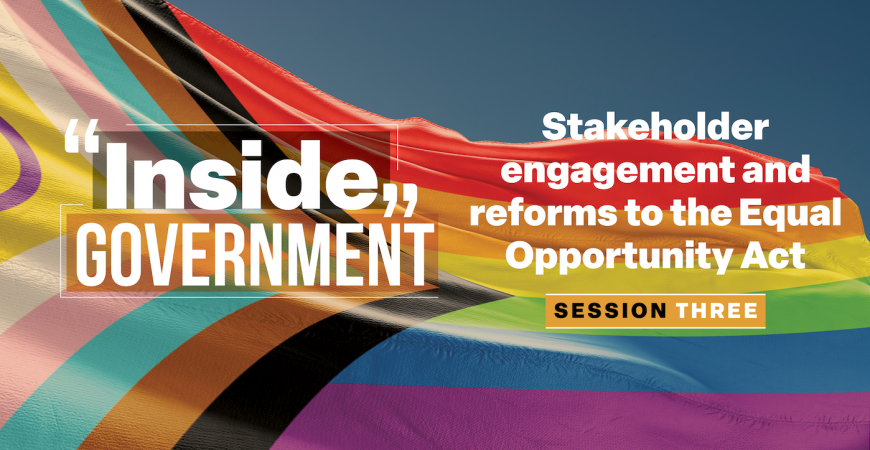Good stakeholder engagement is about building trusted relationships and understanding the priorities of others, as well as building a shared understanding of both the risks and opportunities inherent in different ways forward.
Government hears from a raucous chorus of stakeholders 24/7, and is constantly juggling managing the evolving expectations of the community with the commitments the government was elected on to determine which big-picture issues need to take priority – all while dealing with the day-to-day matters of State.
Amendments to The Equal Opportunity Act
The promised amendments to WA’s Equal Opportunity Act 1984 provide a good example of an important long-term reform appearing to lose priority, among the countless other issues confronting the WA Government.
The Law Reform Commission (LRCWA) made 163 recommendations in its final report, which the Government “broadly accepted”. One of the recommendations was to remove the ‘disadvantage test’ for sexual harassment complainants. WA is currently the only jurisdiction that still has this – meaning the onus is on complainants to produce a complex legal argument and prove they were harassed.
Implementing the LRCWA recommendations would also mean non-binary people can be legally recognised as such in WA – again, the last jurisdiction in Australia where this is not possible. Federally, non-binary people can hold an Australian passport marked ‘X’ but within the State are stuck with male and female options.
The WA Government tabled the final report of the LRCWA review in August 2022, and later that year committed to banning gay conversion practices and abolishing the gender board. NSW banned conversion therapy very recently, joining the ACT and Victoria whose legislation passed in 2020 and 2021, respectively.
Since the WA Government made those commitments in 2022, very little has been heard.
The wait for these reforms is disproportionately affecting women and queer people in Western Australia, with young trans people 15 times more likely to have attempted suicide in their lifetime compared to the general population. Further, human rights researchers now commonly address the frequency and severity of violence towards trans people as an epidemic.
While WA lags behind the nation in a range of areas relating to the reforms, the WA Government has an opportunity to lead by implementing stronger protections for LGBTQIA+ staff and students in religious schools. In the last week of March this year the Commonwealth Attorney-General tabled a report from the Australian Law Reform Commission recommending the same, to be built into updated Federal anti-discrimination laws.
Equal Opportunity Act
Whilst the WA Attorney-General had previously promised to introduce the new bill before the end of 2023, The West Australian reported before Christmas that the “overhaul of the Equal Opportunity Act had been delayed and may not be introduced in this parliamentary term”.
The push for the recommended reforms to the Equal Opportunity Act is coming from a broad range of women and queer stakeholder groups. We’ve seen opinion pieces published in The West Australian, a letter signed by health and women’s groups sent to the Premier, and a new campaign from Rainbow Futures. The Centre for Women’s Safety and Wellbeing ran media saying they were “extremely concerned” about the delays. WA Labor’s own ‘Rainbow Labor’ branch moved a motion at the State Labor Conference which passed without objection, urging the government to implement the reforms before the 2025 State Election. A new rights group ‘Queer Liberation Boorloo’ activated in 2023 and has now thrice held public protests asking for action in this space. PFLAG, Transfolk of WA, United Workers Union, Fair Agenda, Australian Professional Association for Trans Health, and Australian Lawyers for Human Rights are all on board.
In response, the WA Government’s own queer Members are advocating to their Ministers for change. The tension has increased in the first half of the Parliamentary sitting calendar, evidenced by ongoing transphobic questions largely from an Independent MP and a transphobic motion debate in the Legislative Council.
Without a doubt, these Equal Opportunity Act reforms will positively impact a large group of West Australians. We knew that the marriage equality legislation would do the same, and a lesson on building public support can be learned from this campaign. Regardless of the criticality of the reforms, to push the issue towards the top of the government’s priorities in such a competitive arena will require more; more perseverance and resilience from the queer community, and a more intensive and coordinated campaign and clear message. Not just from women’s and queer groups, but from family violence organisations, allies, and supportive stakeholders from a broad range of backgrounds. This will position the reforms within a wider scope of community needs and avoid its positioning as a fringe issue with limited political consequence.
Note:
‘Queer’ is used colloquially through this blog as an umbrella term to describe the lesbian, gay, bisexual, transgender, queer, intersex, and asexual communities.
 ReGen Strategic
ReGen Strategic